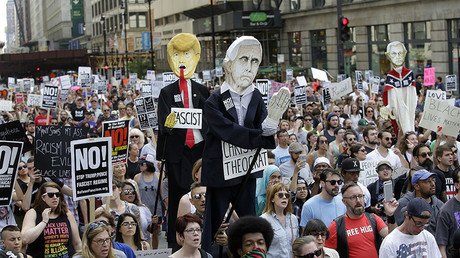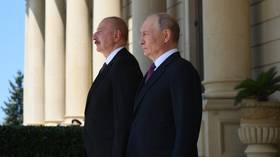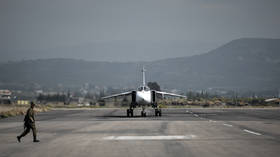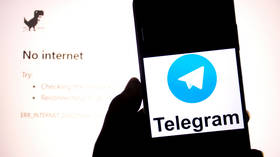White House says Trump condemns KKK & neo-Nazis after Charlottesville statement backlash
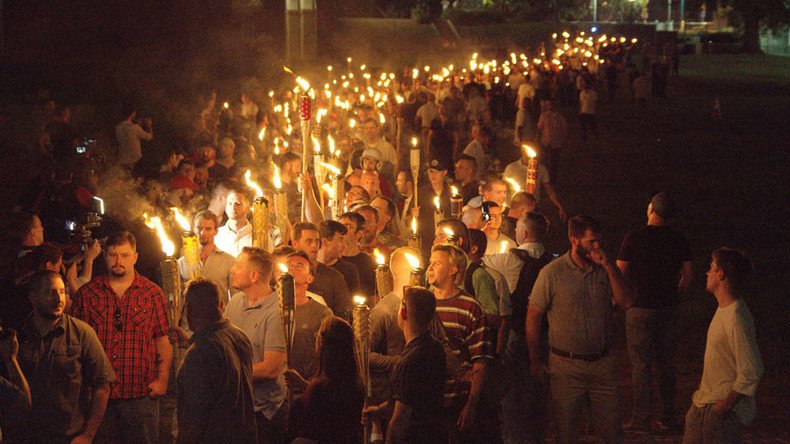
In an apparent attempt at damage control, the White House clarified on Sunday that by condemning violence “on many sides” without explicitly attributing guilt, President Donald Trump did not aim to exculpate white supremacists.
Attorney General Jeff Sessions told NBC’s Today Show on Monday that Trump made a “very strong statement” following the Charlottesville violence on Saturday, adding that it “directly contradicted the ideology of hatred, violence, bigotry, racism, white supremacy...”
“I thought it was a good statement... the next day, yesterday, they explicitly called out the Nazis and the KKK,” Sessions said, referring to a Sunday statement from the White House.
That remark prompted the NBC hosts to point out that the Sunday statement was from the White House and not Trump, and to ask whether the president would be explicitly condemning white supremacist groups on Monday.
In response, Sessions said the president would be “speaking to the people” on Monday, but he was “not sure what he’ll say.”
He added, however, that Trump was “appalled” by what happened in Charlottesville.
A White House spokesman said on Sunday that the neo-Nazis were “of course” on the list of people condemned by the president.
The statement, issued by the White House Sunday, more than 24 hours after the onset of the violence in Charlottesville, purported to set the record straight.
Pointing out that Trump had “very strongly” condemned violence whatever its source, the statement went on to stress that “of course, that includes white supremacists, KKK [Ku Klux Klan], Neo-Nazi and all extremist groups.”
WH clarifies Pres. Trump's statement on Charlottesville: "He condemns all forms of violence, bigotry and hatred." https://t.co/jOjqtAGj29pic.twitter.com/fdH39MI3Wz
— ABC News (@ABC) August 14, 2017
Vice President Mike Pence on Sunday also apparently sought to mitigate the negative effects of Trump's rather vague initial statement telling a press conference in Cartegena, Colombia, that “we have no tolerance for hate and violence from white supremacists, neo-Nazis or the KKK.”
However, the damage had been already done. In the space before the belated follow-up clarification was issued, a host of Trump’s opponents along with Republican lawmakers were quick to call him out for hushing up what many view as the most important side of the story – the alleged white supremacist background of the driver who allegedly slammed his vehicle into counter-protesters, killing one, James Alex Fields Jr.
#Trump condemns ‘display of hatred, bigotry & violence on many sides’ after #Charlottesville clashes https://t.co/EzTwN5o75Upic.twitter.com/V1r02egQw4
— RT (@RT_com) 13 августа 2017 г.
“Very important for the nation to hear @potus describe events in #Charlottesville for what they are, a terror attack by #whitesupremacists,” Senator Marco Rubio (R) tweeted.
Very important for the nation to hear @potus describe events in #Charlottesville for what they are, a terror attack by #whitesupremacists
— Marco Rubio (@marcorubio) August 12, 2017
Senator Cory Gardner (R) called on Trump to “call evil by its name” calling the attack, which is being treated by police as a “vehicular homicide,” an act of “domestic terrorism.”
Mr. President - we must call evil by its name. These were white supremacists and this was domestic terrorism. https://t.co/PaPNiPPAoW
— Cory Gardner (@SenCoryGardner) August 12, 2017
If the language of Trump’s fellow Republicans was not strong enough, his political rivals have stepped the rhetoric up a notch.
“Having reflected, I have now concluded the #Charlottesville speech by @realDonaldTrump shows he is a coward. Hope he finds some courage soon,” Rep. Ted Lieu (D-California) wrote.
Having reflected, I have now concluded the #Charlottesville speech by @realDonaldTrump shows he is a coward. Hope he finds some courage soon
— Ted Lieu (@tedlieu) August 13, 2017
Rep. Maxine Waters (D-California), a fervent and a long-time critic of Trump, went as far as to pin the blame on the US leader for being on the same side as the far-right crowd.
“Trump refuses to condemn white supremacists & terrorists who showed up in Charlottesville. Is he sending a signal? Everyone must be careful,” Waters wrote, before adding “No, Trump. Not on many sides, your side.”
Trump refuses to condemn white supremacists & terrorists who showed up in Charlottesville. Is he sending a signal? Everyone must be careful.
— Maxine Waters (@MaxineWaters) August 13, 2017
However, it’s Charlottesville Mayor Michael Signer who has apparently been the most direct at linking the tragic events in his city to Trump's political agenda.
“Look at the campaign he ran,” Signer said Sunday on CNN’s ‘State of the Union’, suggesting it had attracted and inspired racist groups in the country.
On NBC's ‘Meet the Press’, he commented: “Old saying: when you dance with the devil, the devil doesn't change, the devil changes you.”
The White House clarification on the matter did little, it seems, to mend the situation and stop the uproar, as commentators displeased with its timing and obscure manner of delivery slammed Trump, a prolific social media-user, for not speaking up himself.
“White House criticizes media for using anonymous sources, then WH cowardly issues an anonymous statement that POTUS meant more than he said,” former US Office of Government Ethics Director Walter Shaub wrote, noting that no official statement was put on the White House website regarding the protests.
According to the White House, nothing much happened yesterday. pic.twitter.com/r1NpSbJgwd
— Walter Shaub (@waltshaub) August 14, 2017
Some witty Twitter users compared Trump’s silence on the issue to the statement by Tiki, a company that makes torches used by white supremacists at the rally, which outright rejected any association with right-wing violence.
How is this tiki company's statement better than trump's? pic.twitter.com/hxoEDpLgpo
— Leticia Miranda (@letidmiranda) August 14, 2017
Lawyer and filmmaker Mike Cernovich told RT that to say that violence is being generated on only one side of political extreme is to distort the facts.
“What we saw today is a part of a broader trend which actually started in what they call in America the Battle of Berkeley, there were some of these ‘alt-right’ [the white supremacists’ preferred rebranding term] events, they went to a park and then the left-wing groups, called Antifa, antifascists, but really [they] were not distinguished both from Nazis, they got in huge street fights in the middle of Berkeley like nothing I have ever seen,” Cernovich said.
Earlier this year a serious of violent protests shook the city of Berkeley, California, where anti-fascists clashed with far-right activists over the planned appearances by high-profile conservative figures such as Milo Yiannopoulos and Ann Coulter. The appearances were eventually canceled under pressure from the protests.
Cernovich argued the media is partly to blame for publicizing the right-wing rallies, which otherwise would attract several hundred people at best who would protest peacefully and go home.
“Since the inauguration, America has been in a state nearly of civil war for the past several months and there has been a lot of violence on both sides,” Cernovich said.
Political cartoonist Ted Rall argued that Trump is at least partially to blame for the spike in what he sees as right-wing violence.
“The president is, I think, concerned that part of his base sympathizes with these people, so he doesn't want to antagonize them and that's only making things more dangerous,” Rall told RT.
Saying that over many decades he doesn't remember “any torch light parades of far-right-wing, pro-KKK [Ku Klux Klan], pro-neo-Nazi people marching in the streets,” Rall warned that Trump might be “playing into the hands” of such opportunists “by trying to play the egalitarian card and saying that all sides need to be peaceful.”
